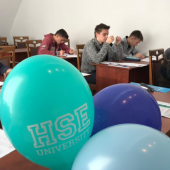If you need some extra help with IELTS, consider these courses to make your test a success.
When travelling to study in a primarily English speaking country, universities and colleges will often require applicants to take an English Language Qualification, to prove that they have the language skills necessary to keep up in classes and society in general. Some of these qualifications are also necessary for obtaining a visa, depending on your destination country of choice.
You may think with this being such an important qualification, that there is only a single test that everybody must take, but the reality is that there are a lot of tests available. Some institutions can get rather particular about which qualification they will accept, so make sure the one you take is the right one. Otherwise, which of the many is the right qualification for you?
Each of the following English language tests are accepted by most countries and many institutions around the world, including universities, government agencies, professional and industry bodies, and multinational companies.
Universities will state their English language requirement in a variety of tests, including the minimum overall grade, and typically the minimum grades required in writing, speaking, listening and reading.
The required test scores will differ in between institutions, and often in course- medicine and law will typically require higher scores, for example. And you will also need to pass the visa requirements if you require a student visa.
There are lots of English Language Qualifications, though perhaps the two best known are IELTS and TOEFL.
International English Language Testing System (IELTS)
If you need some extra help with IELTS, consider these courses to make your test a success.
The IELTS test is widely recognised around the world. It is under three hours long and is similar to the TOEFL in that there are four sections: reading, writing, listening and speaking.
Once complete, a score for each section will be given- between 0 and 9 (with 9 being the highest) then averaged out for your final grade.
There are two types of the IELTS test: Academic and General Training.
The IELTS Academic test is for people applying for higher education (undergraduate and postgraduate courses) or professional registration in an English speaking environment. It reflects some of the features of academic language and assesses whether you are ready to begin studying or training.
The IELTS General Training test is for those who are going to English speaking countries for secondary education, work experience or training programs. It is also a requirement for migration to Australia, Canada, New Zealand and the UK. The test focuses on basic survival skills in broad social and workplace contexts.
Visit the IELTS website to find out more information about where and how you can sit the IELTS test.
Test of English as a Foreign Language (TOEFL)
Much like IELTS, TOEFL is recognised the world over, being recognised by more than 10,000 colleges, universities and agencies in more than 130 countries, including Australia, Canada, the UK and the United States.
TOEFL is usually taken online, in a test known as the TOEFL iBT Test, though it will still have to be taken at an authorized test centre. If the test centre does not have internet access, then a paper-based exam is also available (TOEFL PBT).
The test takes a day (perhaps around five hours) and like IELTS has four different parts: reading, writing, listening and speaking. Participants will get a score for each of these four areas then an overall score, on a scale from 0-120.
There are plenty of resources online to practice for the TOEFL, including some sample test questions on the TOEFL website.
Pearson Test of English Academic (PTE Academic)
PTE Academic is a very recent English language test that sells itself on fast and trustworthy results, with results after five business days and security measures such as palm-vein scanning and data forensics.
While the PTE Academic is available in over 50 countries, and can be accepted for Australian and New Zealand student visas, it is not as widely accepted as either TOEFL or IELTS. Nevertheless, it remains an appropriate qualification for many undergraduate, postgraduate and MBA students.
The exam lasts three hours and is made up of 20 different types of tasks, based on speaking, writing, reading and listening, specifically involving a number of real-life settings. Much like the TOEFL iBT Test, it is computer based.
Those that take the test will receive an overall score between 1 and 90, as well as individual scores for each skill area.
Pearson also operate a Pearson Test of English General, which, as the name suggests, is a more general English language qualification, but this is not as recognised as the Academic Test by either universities or border control.
Cambridge Assessment English is an exam board offered by a non-teaching department of the University of Cambridge. Prior to 2013 this test was known as the Cambridge ESOL and also as Cambridge English Language Assessment.
Cambridge Assessment English has been offering English language qualifications for over a century which are recognised by over 20,000 universities, employers and governments around the world.
Exams are offered at a variety of levels from Starter and Schools through to Advanced and Business. Cambridge also offers qualifications for those studying or working in accountancy, finance or international law.
One of the courses they offer is C1 Advanced, formerly known as the Cambridge English Advanced exam. It is aimed for students following a degree-level course at university. It is widely recognised by institutions in over a hundred countries and is frequently accepted when applying for a student visa.
There are four sections that make up the C1 Advanced exam- Reading and Use of English, Writing, Listening and Speaking. It takes around four hours in total and requires you to book it in an exam centre, of which Cambridge have many across the globe.
Although those four are the most widely accepted English Language Qualifications, there are many other qualifications for speakers of English as a second language that may be offered and accepted by various universities and student visa applications. They include:
Ascentis
Ascentis is a company that offers a wide variety of qualifications, everything from employability skills to courses on British Values. As such, they also offer tests in English proficiency for all ages and levels.
The qualifications that Ascentis offer though, are less all-encompassing than those offered by TOEFL or IELTS and are more focused for those that wish to study and work in the United Kingdom. That being said, they do offer a wide range of qualifications, so you can go from not speaking any English to high school level English to functional English with Ascentis.
City and Guilds (C&G)
There are eight internationally available qualifications that City and Guilds offer for English- one for Business Communications and the rest in General English.
The best known is perhaps the International Certificate in English Language, which is intended for non-native speakers of English worldwide; people needing English for their everyday or working life; learners who require externally recognised certification of their levels in English and those who require a series of graded examinations to provide steps up in the ladder of proficiency.
Much like other English qualifications, there are five sections: Speaking, Listening, Reading, Writing and Vocabulary.
In addition, they offer qualifications for young learners, English language teachers and spoken English.
English Speaking Board International (ESB)
The ESB have test centres all over the world, offering qualifications focused on communication skills at school, in college and throughout life.
ESB qualifications focus on effective communication skills, with a practical emphasis, with a history of providing high quality, flexible assessments. They offer English language qualifications on a wide variety of types, from debating to group speaking, from interview skills to professional learning.
For international students, they offer the ESOL International set of qualifications. ESB ESOL International qualifications are designed for learners who are not native speakers of English and who wish to achieve a high quality, internationally recognised in English. It is mapped to the Common European Framework of Reference for Languages (CEFR) and is designed for learners who are able to communicate independently in English. The 2 hour 30-minute examination is externally assessed and consists of Listening, Reading, Use of English and Writing. The Speaking test is conducted separately; candidates are assessed in pairs.
London Chamber of Commerce and Industry (LCCI)
The London Chamber of Commerce and Industry is owned by Pearson, one of the biggest education companies in Great Britain, awarding many of the country’s standard school qualifications.
Their international student’s English qualifications are under the branding of LCCI, whose qualifications are used by employers and universities worldwide as evidence of language proficiency.
Aligned to the Common European Framework (CEF), their English language range mostly covers English for business students, including commerce, tourism, industry and accounting.
For non-native speakers of English, the LCCI offers a series of JETSET ESOL qualifications, covering listening, reading, writing and speaking, they offer a high-quality English qualification that's available and recognised worldwide.
Password
Password are an English language testing company that, rather that supplying individuals with English tests, instead partners with hundreds of universities, colleges, schools and employers who wish to deliver high quality online testing.
They offer a range of tests, including employability and maths tests, as well as tests for younger pupils. There are two tests that students of English may take- the Password Skills Test and the Password Knowledge and Writing Test.
The skills test consists of four test modules: reading, writing, listening and speaking. The test takes just over three hours in total.
The knowledge and writing test is made up of two modules, with Password Knowledge taking an hour and being a sophisticated test of grammar, vocabulary and reading. The Password Writing test assesses one’s ability to write an essay. You get a choice of two essay titles and have to write at least 200 words in 30 minutes.
Teaching Knowledge Test (TKT)
The Teaching Knowledge Test is also administered by Cambridge Assessment English, though it is designed specifically for proving your ability to teach English with a globally recognised certificate, accepted in over 60 countries.
On the Teaching Knowledge Test, you will learn English for a variety of different teaching methodologies, know how to use English language teaching resources effectively, understand key aspects of lesson planning and can use different classroom management methods for different needs. The qualification is for the teaching of English to both schoolchildren and adult learners.
There are five modules and you can take as many as you want at the speed that you want. You receive a certificate for each module that you complete. Once you have passed TKT, you can also take other Cambridge teaching qualification such as ICELT and Delta.
Test of Legal English Skills (TOLES)
As the name suggests, the Test of Legal English Skills is for the improvement of English in the world of law. It is made up of three exam levels- foundation, higher and advanced. The exam levels are progressive steps towards reaching the standard of legal English required by employers such as international commercial law firms, in-house legal teams in private companies and top-class translators.
TOLES legal English training materials and exams have been developed following the advice of experienced commercial lawyers. The top requirements of employers are excellent drafting skills, first-class negotiating skills and a strong sense of commercial awareness.
TOLES has training and exam centres all over the world, in South America, North America, Europe, Africa and Asia. For a complete list of registered exam centres, please click here.
Trinity College London (TCL)
Trinity College London is an international exam board that mostly offers qualifications for the performing arts- music, drama, dance and so on. They also offer courses in the English language, both for the teaching of English and English for speakers of other languages.
Their English language qualifications are recognised internationally as reliable evidence of proficiency in English, with a focus on developing communicative and interactive language skills, their exams assess and promote the skills needed for life in the 21st century.
Trinity English language qualifications are suitable for people of all ages learning English as a foreign, second or additional language. Available at all levels, from beginner to advanced, their exams are available to individuals, schools and colleges in more than 60 countries worldwide.










